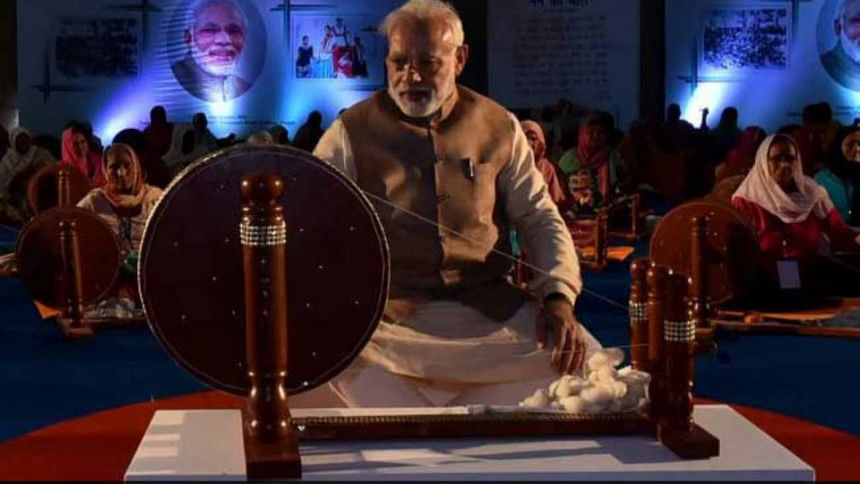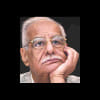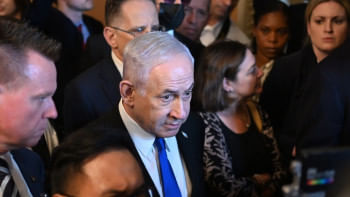Ridiculing the Mahatma

It is hard to believe that the government financed Khadi Board printed Prime Minister Narendra Modi's picture in the familiar pose of Mahatama Gandhi sitting behind the charkha, spinning the yarn, without PMO's permission. Probably somebody at the lower level allowed the Board to go ahead. The furor in the public was so strong that the contradiction was inevitable.
Even then PMO was not as strong as it should have been. In fact, a stern warning should have been issued there and then so that such examples of indiscretion do not go unpunished in future. This might have chastened those who, on one pretext or the other, violate the dignity of the Republic, not realising that they are insulting themselves.
Only the other day, the standing of people was made mandatory when the national anthem was played. People still do not respect the order and open the doors of cinemas even though they are bolted from inside. They think that it was a government order which they did not have to obey.
They do not seem to realise that the national anthem and the Republic's flag are sacred because they represent the nation's honour and sovereignty. People would have to realise themselves that no order or law can instil patriotism. It is their own feelings which should assert whenever the choice is between what benefits the nation and what benefits an individual or party.
Gandhiji himself was conscious of people's feelings. As I wrote earlier he stopped his prayer meeting when someone objected to the recitation of Quran. He resumed it only when the person concerned withdrew his opposition. Gandhiji was, however, more successful in Kolkata where the then Chief Minister Huseyn Shaheed Suhrawardy had declared the Muslim League's action plan in response to the Congress Satyagarh.
The action plan turned into a massacre of Hindus and Sikhs with the connivance. There was retaliation, taking the lives of thousands. Gandhiji went to Kolkata and asked the people to give him their weapon. Even the most affected ones surrendered the arms within 24 hours. Lord Mountbatten, who was then the governor general, remarked that the armed forces were of little consequence and one man force had done the job.
India has traversed a long way since then. It has less faith in pluralism than before. The border drawn on the basis of religion has diluted secularism. But the fault is that of Congress, not that of Muslim League which had demanded from day one the grouping of Muslim majority provinces into a separate, sovereign Islamic state. The Congress which represented secular ethos is itself going away from its ideals.
Maulana Abul Kalam Azad, a tall Muslim leader, had warned the Muslims that if they did not feel safe in the undivided India where they could say that though less in number they were equal shareholders in post-independent India fortunes. But the Muslims were bent upon having even a 'moth eaten Pakistan.' They have inherited a country that discriminates between Muslims and others. In fact, the living condition, whatever their number, leaves much to be desired. There are forced conversions and marriage of non-Muslims to Muslim boys.
The Maulana's warning has come true. Roughly 18 crore Muslims have practically no say in the governance of the country. Their plight, as the Sachar report on Indian Muslim said, was worse than that of Dalits. Politically, they have ceased to matter. Nor do they assert themselves lest the Hindu chauvinism should take a still more virulent shape.
However, the Muslims are themselves hardening their position. The Kashmiris are already behaving as if they are independent. At the time of accession, the popular leader Sheikh Abdullah had supported the Maharaja because he was fighting against the tribals including regular troops. It is a different story that he opposed New Delhi when it went beyond the three issues: defence, foreign affairs and communications.
Chief Minister Mahbooba Mufti has been criticised by the Kashmiris for having met Prime Minister Narendra Modi, who they said was the 'Hindu's leader'. They conventionally forget that he is India's Prime Minister. Whether they support his views or not -- many do not in India -- is not relevant because he came to power after winning the 262 seats in the 540-member Lok Sabha.
The example of Zaira Wasim from Kashmir is before us. She acted admirably in a film and, as Aamir Khan, director and producer, said in a message that she was brilliant. But the pressure of separatists in the Valley was so much that she had to say in a TV interview that she was 'ashamed' of what she had done, disowning her role in the film. Her message was poignant: Girls should not follow her example as if she was telling them about the ordeals she had gone through.
That means that those who are wanting to establish the separate, sovereign Islamic Republic in the Valley are far from satisfied. They know that their opponent was the Indian army. But they go on fighting to register Kashmir's demand for independence. I found them, when I went to Srinagar, relentless.
New Delhi would have to talk to the separatists and see if they could accept real autonomy within India, asking them that India would not spread itself beyond the three subjects: foreign affairs, defence and communications.
The writer is an eminent Indian columnist.

 For all latest news, follow The Daily Star's Google News channel.
For all latest news, follow The Daily Star's Google News channel. 



Comments